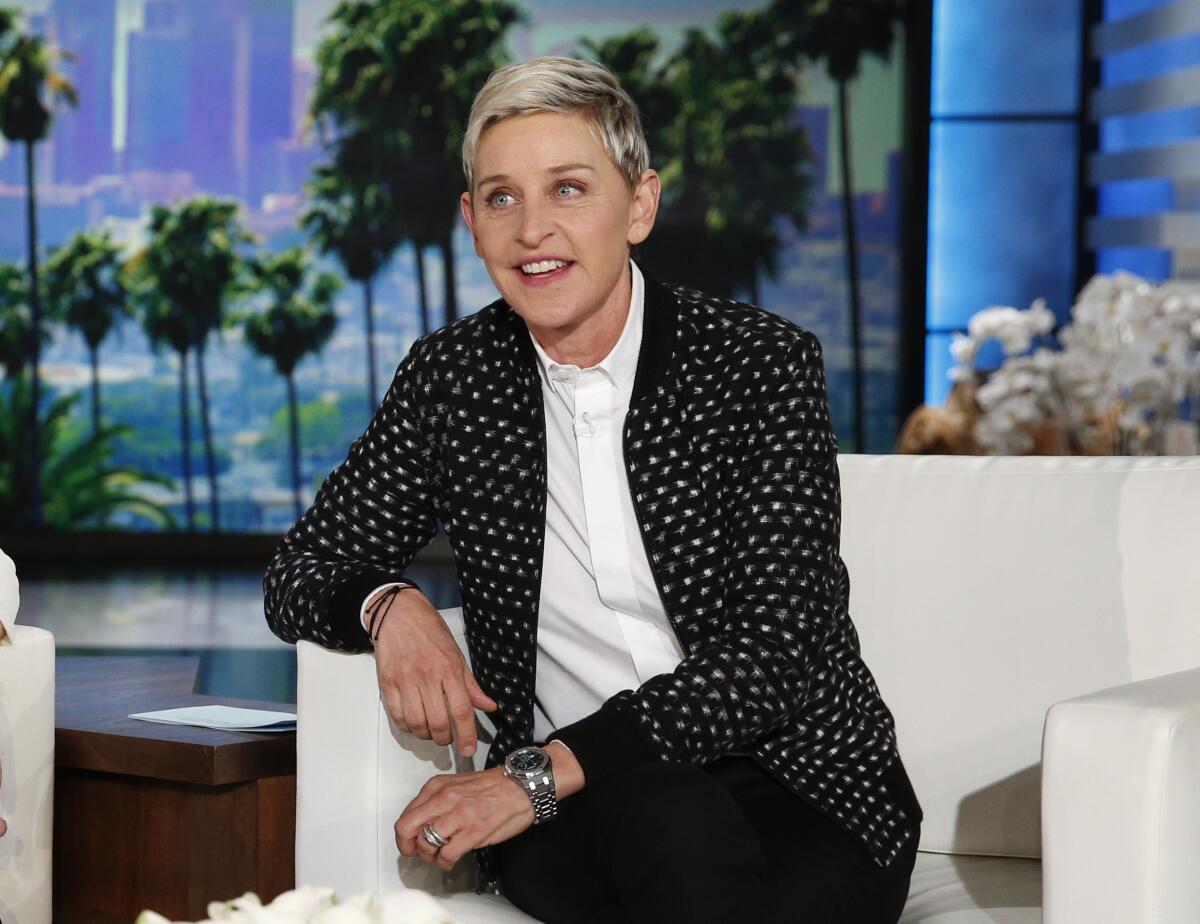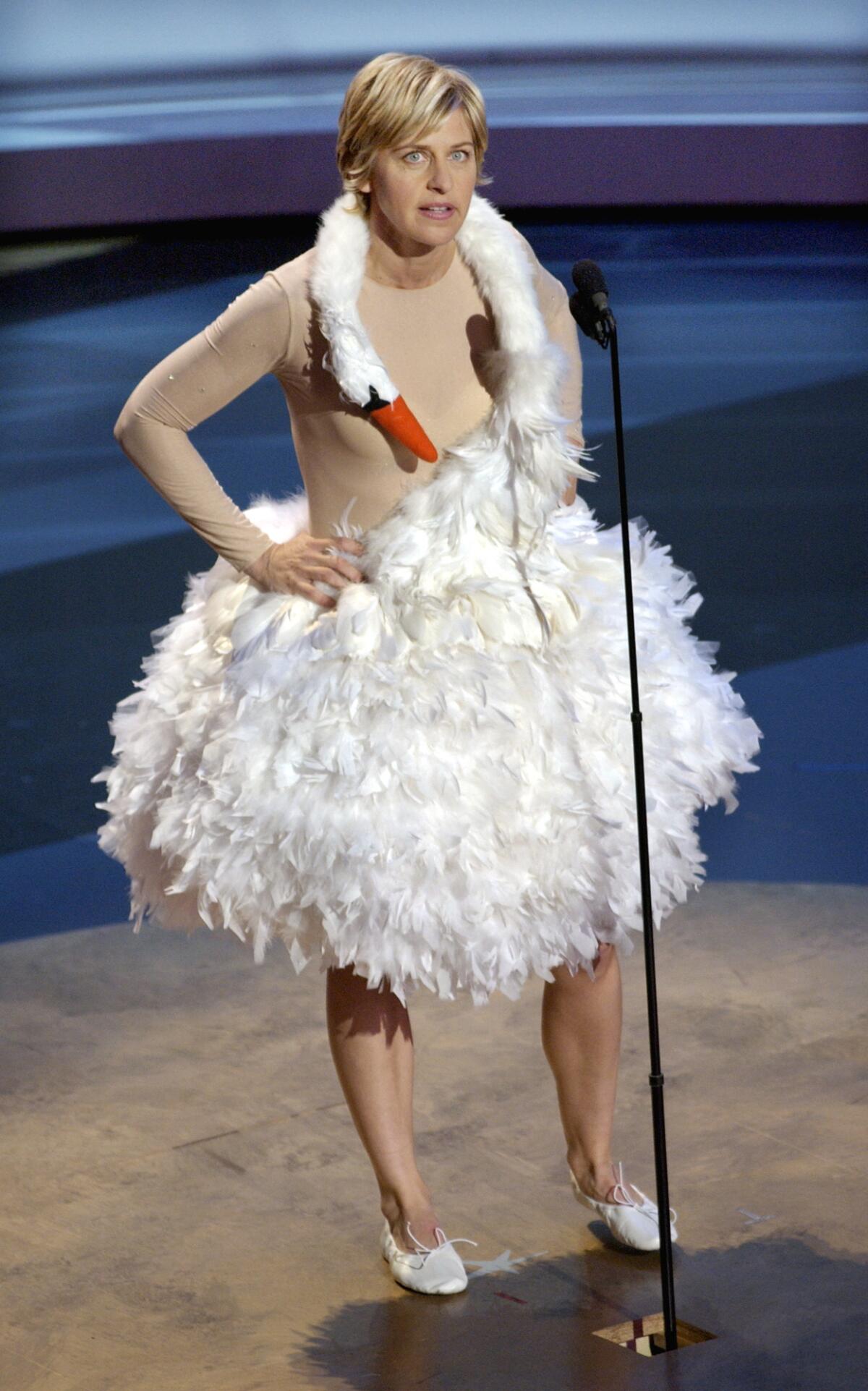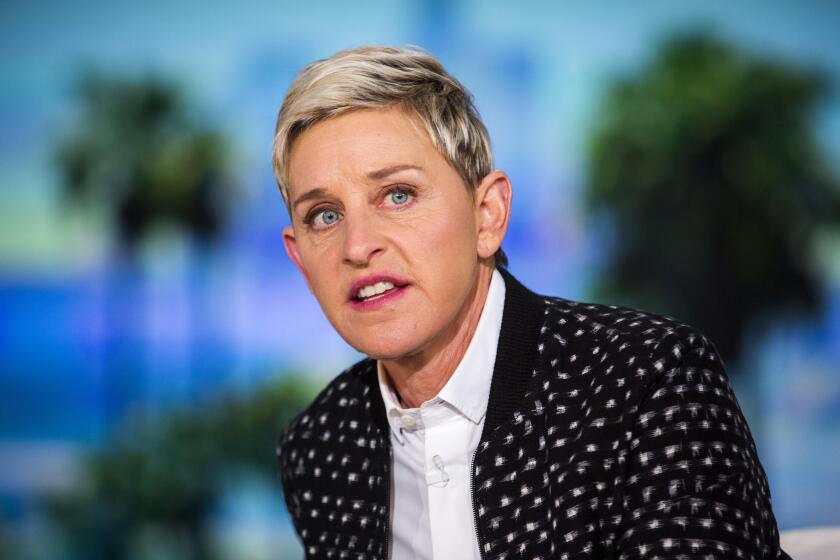Column: Ellen DeGeneres announced the end of her show. Then somehow, she made things worse

- Share via
Here is an important fact of American culture: If you are going to quit your job simply because you’re tired of it, you do not ask Oprah Winfrey to do your exit interview.
If you are super-famous, as Ellen DeGeneres is, you might ask Savannah Guthrie, as Ellen DeGeneres did, but Oprah remains the goddess of difficult life transitions. If you need to take on the royal family, offer a mass apology, explain your side of a very messy situation or receive a public benediction, you talk to Oprah.
So when DeGeneres announced that, after 19 seasons, she would be ending “The Ellen DeGeneres Show” next year because she was tired of doing it — rather than, say, as a reaction to recent accusations of the show being a toxic work environment rife with alleged sexual harassment, accusations that led to three male executive producers being fired this summer — “OK, Ellen, your ratings are in the tank, say what you must” seemed a natural enough reaction, especially for those of us who have been wanting DeGeneres to return to the “comedian, actor” portion of her bio for years.
But when her announcement included a breezy, “Oh, and Oprah will be dropping by to discuss my decision on May 13,” followed by separate announcement of her same-day appearance on ‘Today,’” that reaction bent more forcefully toward, “Sigh. Here we go.”
And there we went.
Ellen DeGeneres announced Wednesday that her popular daytime talk show will end next year. Here’s our guide to the controversy that led to this point.
Despite having previously apologized to her staff (albeit with statements that seemed lawyered into requisite vagueness) for not staying “on top of things” and allowing others to misrepresent “who I am,” and then to viewers — ”I learned things happened that should have never happened. … We’ve made the necessary changes and started a new chapter” — she took a whole new tack with Guthrie.
Continuing her insistence that her decision to call it quits had nothing to do with the revelations that many current and former staff members were not happy in their work and that some had allegedly been sexually harassed, DeGeneres went on the offensive.
“I really didn’t understand it,” she said to Guthrie, presumably of the reports and subsequent internal investigation that dominated the summer. “I still don’t understand it. It was too orchestrated. It was too coordinated. And people get picked on, but for four months straight for me?”
At some point she threw in the word “misogynistic,” implying that she was being held to a higher standard because she was a woman.
Female bosses are indeed often held to a different standard than their male counterparts, particularly when it comes to the social construct of “niceness.” But if DeGeneres is being held to a “higher” standard (though I would argue that “sexual harassment-free” is a very low bar for any workplace), it’s not because she’s a woman but because she has built a very successful and lucrative brand as the “Be Kind” woman.
And frankly, it does not appear she actually is being held to a higher standard — after a century of celebrating its “den of vipers” reputation, Hollywood in general is finally being forced to reckon with all the damage it has done by shoving a panoply of terrible behavior under the cloak of “high-stress environment.”
If DeGeneres is going to use conspiracy-theory terms like “orchestrated” and “coordinated,” it might be helpful if she clarified her own accusations. What exactly was orchestrated and coordinated? The accusations? And, more important, by whom? A few disgruntled employees? Twitter trolls? Audience members who were not chosen to compete for cash?
I certainly hope she is not blaming the media, because a Warner Bros investigation found enough justification in early reports by Buzzfeed to fire the aforementioned executive producers.
As she has said before, DeGeneres told Guthrie that she had no idea staff members were unhappy because the A-list guests always seemed quite pleased and the show had 255 employees who worked in different buildings.
While the first has nothing to do with anything, the second makes sense. DeGeneres has an easygoing, highly accessible persona, and as she discussed in her terrific 2017 comedy special, this can make life a bit difficult. Especially, one imagines, for a woman at the head of a very high-profile and lucrative business that involves hundreds of people waiting in a sweltering parking garage for the chance to see her show live each and every day. Often with “We love you, Ellen” signs.
Fame like that can be stifling, and if DeGeneres chose to insulate herself from her staff to avoid ongoing “There’s Ellen, she’s always up for a chat” interruptions, that’s perfectly valid and not necessarily unkind. Like every sought-after star, she is a finite resource and the fact that she doesn’t know the names of her employees does not make her a monster, just very busy and mindful of her own sanity.

But if you choose the “don’t call me unless the house is on fire” model of delegation, you probably should keep a close eye on the people in charge of the matches, and when the house is actually on fire, you must take responsibility for that choice.
This summer, DeGeneres did actually take responsibility, albeit very carefully. But then, after swearing her decision to end the show was completely benign, she first went on “Today” to complain about an “orchestrated” attack, and then summoned Oprah to close the proceedings with a general benediction. Which just added to the toxicity of the whole situation.
I, for one, had been thrilled to learn that DeGeneres was ending her show for the simple reason that I always thought it cost us a very talented comedian and actor.
DeGeneres’ career before “Ellen” was unique. As a stand-up and then a sitcom star, she elevated LGBTQ rights in this country — courageously, tenaciously and at great personal cost. The sitcom “Ellen” was terrific, and not just because it gave us the “toaster oven” joke or even because it featured both DeGeneres and her character coming out, a multilayered first for American television. It was just a very good show and DeGeneres was very good in it. That it ended, and that her next show foundered, and she subsequently struggled to find work, had nothing to do with her talent and everything to do with homophobia, sexism and a culture that did not appreciate a lesbian standing up for herself in an authentic way.
Hollywood has long rewarded, even encouraged, monstrous behavior. And the bullies won’t be stopped until the mythmaking around them stops.
When she was offered a talk show, it made sense for her to take it. And while other stars with similar shows failed, she succeeded. Wildly. But as much as I appreciated the clips of certain interviews or dances (especially with Michelle Obama), it was hard not to wonder what DeGeneres could have been doing during television’s recent renaissance if she were not golden-chained to a chat show and growing empire.
After all, this was the woman who hosted the Emmys soon after the 9/11 attacks in a way that turned the show into both an outlet for collective grief and a celebration of resilience. The woman who “broke the internet” with her Oscars selfie and managed to goose the telecast’s ratings twice. The woman who, as Dory in “Finding Nemo,” gave one of the best film performances of the 20th century. (Fight me.)
As a television critic, I often wondered what DeGeneres’ career would have looked like if she hadn’t been so busy complimenting the work of other stars and handing out stuff. Her 2017 comedy special, “Relatable,” only made the wondering more painful — DeGeneres still has a clear-eyed and humane sense of observational comedy, which manages to be both gentle and very direct. The title of the show came from her contemplation of whether her extreme wealth and fame had somehow made her irrelevant as a comedian, something, it must be said, few if any of her male counterparts have ever thought to address.
So it would be really great if she would either publicly clarify what forces she believes conspired to damage her reputation by revealing workplace abuse, or stop talking about it and privately figure out the part she played. Maybe she could redirect the conversation by having Melissa McCarthy and Ben Falcone on to discuss why they should stop making films together, or maybe she should just start saving string for a new dramedy about a TV host whose kindness, real or imagined, becomes her downfall.
More to Read
The biggest entertainment stories
Get our big stories about Hollywood, film, television, music, arts, culture and more right in your inbox as soon as they publish.
You may occasionally receive promotional content from the Los Angeles Times.












